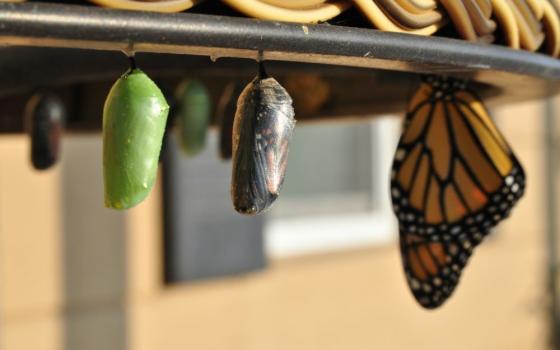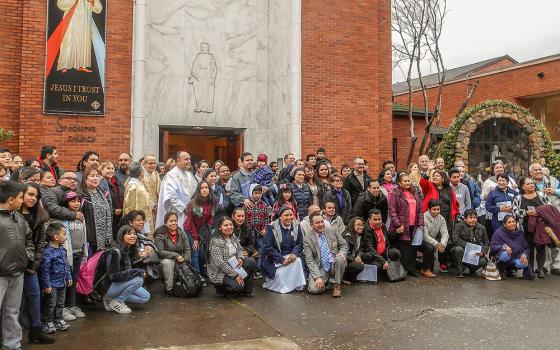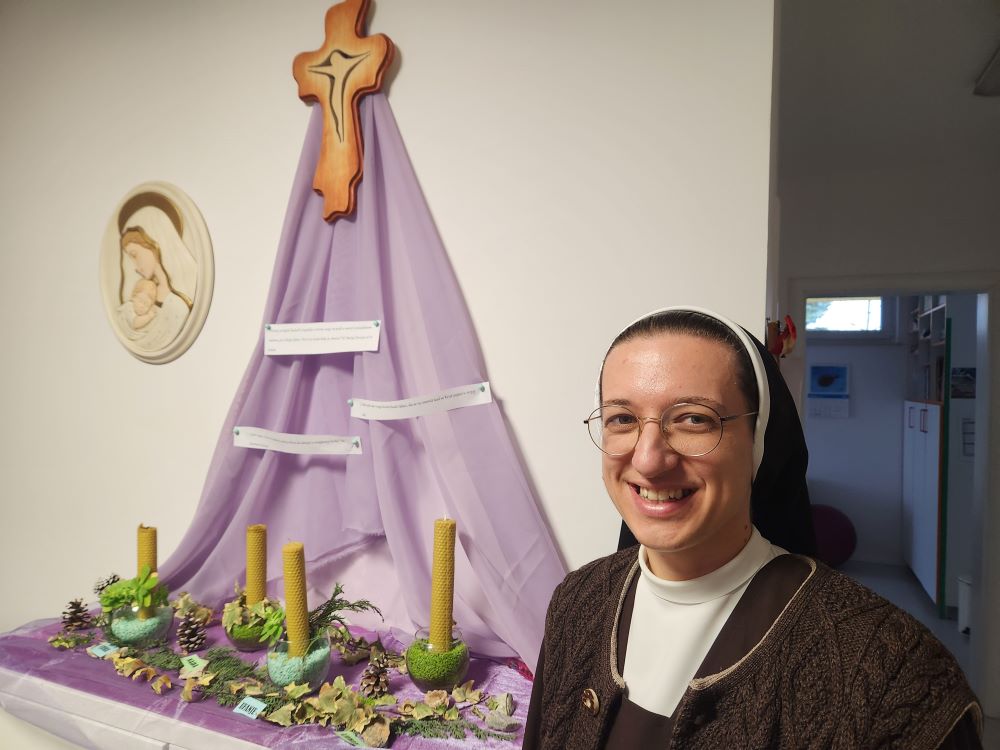
Sr. Marija Lucija Eršek is the principal of the St. Joseph's Home for Children, outside the Croatian capital of Zagreb. The home is run by the Carmelite Sisters of the Divine Heart of Jesus. It houses 26 children or young adults. (GSR photo/Chris Herlinger)
Outside the Croatian capital of Zagreb, the Carmelite Sisters of the Divine Heart of Jesus house a center and home — the St. Joseph's Home for Children — that is part of a mission tradition to help those most in need in Croatian society. GSR recently interviewed Sr. Marija Lucija Eršek, principal of St. Joseph's Home for Children, who helps administer the center. The co-ed home houses 26 children or young adults, ranging from ages 6 to 22, while 25 sisters and four novices live in the convent.
The work of the Croatian sisters is undergirded by the charism of helping children, something that was important to the congregation's foundress, Blessed Mother Mary Teresa of St. Joseph, a German sister who lived from 1855 to 1938.
Translation was provided by Sr. M. Viktorija Sanjković.
GSR: Given the fact that Croatian society is still in some way recovering from the war of independence in the 1990s, do you see your work as in some way healing society's wounds?
Eršek: I was born in 1988, and I was a child in the war, but between then and now, a lot of time has passed. And this part of Croatia didn't feel the effects of the war as much as other places, so we can't speak from that perspective. But there are still many challenges in our society, and the children who live here come from different traumatic family experiences — there are a lot of reasons why families become dysfunctional, and helping children grow in a good environment is how we feel we are helping our society in some way.
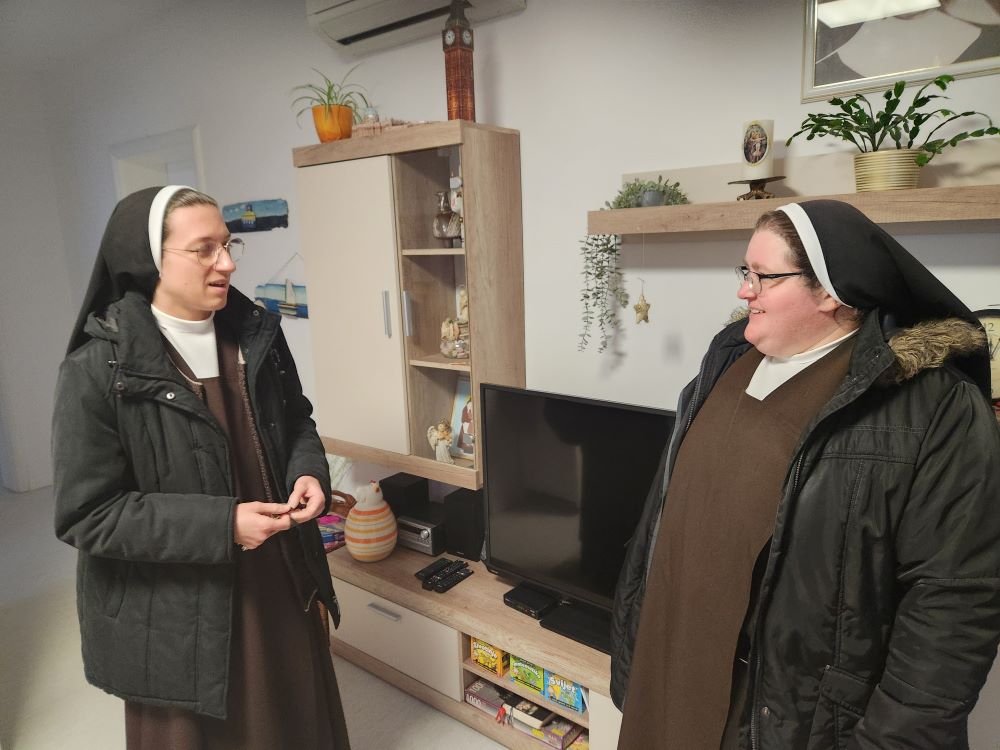
Sr. Marija Lucija Eršek, left, principal of the St. Joseph's Home for Children near Zagreb, Croatia, speaks to Sr. M. Viktorija Sanjković at one of the home's residences. Both are members of the Carmelite Sisters of the Divine Heart of Jesus. (GSR photo/Chris Herlinger)
What kind of traumas are you dealing with?
There are 26 children here, and their stories are all different. Some of their parents have been drug abusers or have serious alcohol problems, others face challenges with mental illness. Some are just not well-equipped to be parents. There are some children who simply don't have proper parental care.
There are many kinds of trauma or abuse the children have experienced — emotional, sexual, psychological, forms of neglect, some kind of inappropriate behavior by parents. Sometimes the family has been homeless and parents and children have had to beg. These are serious traumas.
So, the children have been placed here by a social worker. They are able to attend public schools nearby.
Do you see changes in the children?
Yes. After being here for a time, many feel that for the first time that they are safe and that for the first time, someone cared for them.
We see a lot of improvements in the children — gradual and noticeable change in a few months, depending on how much the child was neglected. We give them safety, structure and order — things that they often do not have in their families. We offer them Catholic education, opportunities for prayer and confession. Baptism is offered if the children and parents want that — some of them are being introduced to the faith for the first time.
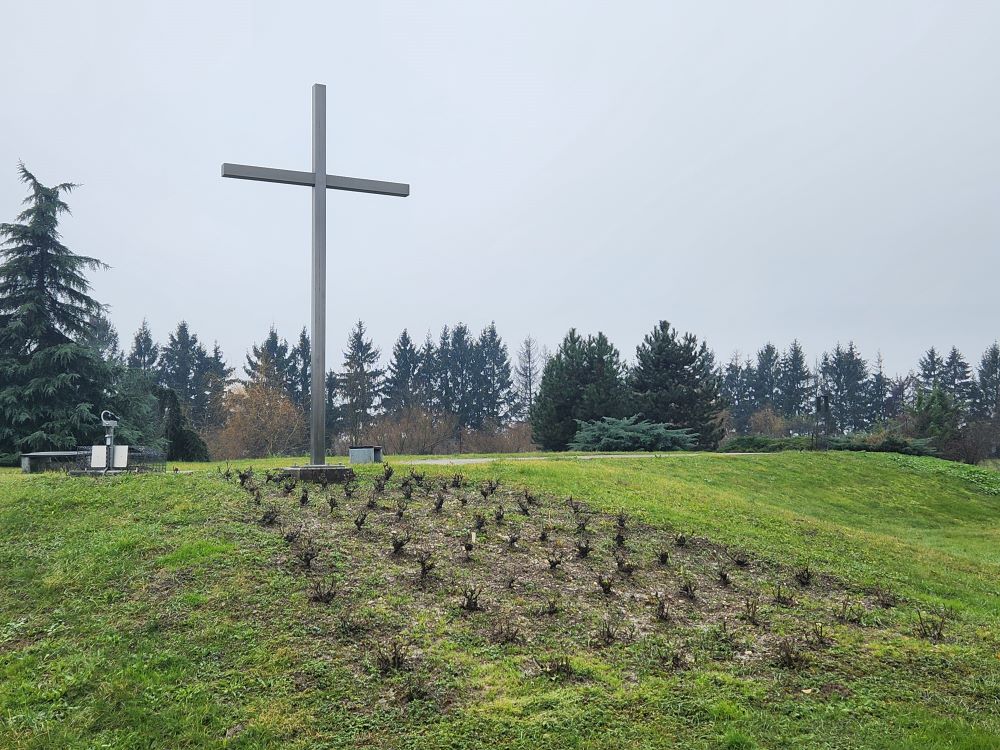
A garden and cross stand on the grounds of the St. Joseph's Home for Children, outside the Croatian capital of Zagreb. (GSR photo/Chris Herlinger)
How do you encourage relationships between the children and their parents?
We always try to encourage ongoing relationships between the children and their parents, and to keep that a positive aspect for all of them, encouraging visits here by the parents. The children love their parents no matter what the family problems are. We try to show respect to every parent and think every person, parent or child, is a child of God and worthy of respect.
At the same time, if we know the relationship is a danger to the child, we will protect the child and ask for help from social workers. Child protection is always our first priority. Even though the child is separated from the parents and no longer lives with them, the parents still often have an influence, so it is very important to take care to avoid new traumas and wounds. Sometimes there is a danger of too much influence of the parents who turn to manipulation, but the solution to such situations is always found in cooperation with social welfare centers and courts.
With the visits, we try to understand the overall situations families find themselves in. Those situations can be a challenge for everyone, but on our part, we don't judge or blame, and we hope the parents feel that. We feel parents generally did the best they could do in the circumstances they have faced.
Social workers or courts decide on approving the visits, but once the parents are here, there are no strict rules. Some parents visit every week, others only on the weekend. Of course, there are cases where some parents are forbidden to meet their children.
Depending on the situation, some children are adopted by other families, and there are sometimes advantages to that — some do well adopted — but many stay here until they can become independent, in their early 20s, because we do offer opportunities for good care. And many say they don't want to leave and return to their families.
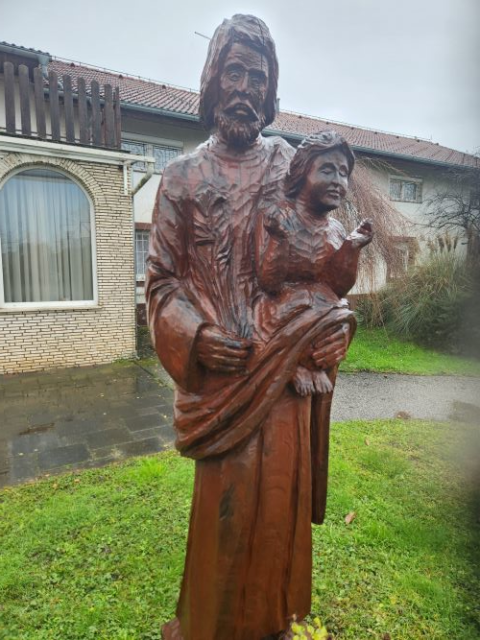
A statue of St. Joseph and the infant Jesus at the St. Joseph’s Home for Children, outside Zagreb, Croatia (GSR photo/Chris Herlinger)
There must be challenges for you, the sisters.
Sometimes at first, the children behave badly, of course. While we warn them, we try to show them a better way, and I think in all cases they know that we love them.
We can't deny the many challenges for both parents and children today, even in the best of circumstances, with both parents working, economic challenges and pressures, and the less influence parents have on children because of pressures from the outside world, like social media. Things are often not ideal for children's upbringing today. It's harder to grow up and become responsible people with all of the outside influences.
Do you consider the home an orphanage?
No. There are some orphans but in most cases, the children continue to have a relationship with their parents. We think of our home as a home for children without adequate parental care — work that continues a tradition of our foundress who herself experienced homelessness and who loved St. Joseph and decided to give everything to his hands. The love of St. Joseph continues to this day. We feel his presence in our everyday life. He takes care of us. We learn from St. Joseph. He was the provider of the Holy Family in times that were insecure. He put his family in God's hands.
With prayer to him and to benefactors, we now have three buildings housing the children. It was a miracle. There are up to nine children in each residence, with a sister living in each house. Other sisters from the convent help when needed, for example on weekends or when a sister is absent from home. We encourage a family spirit and adhere to a belief that the sisters shouldn't be teachers to children but mothers. We try to provide a safe environment and emphasize empathy and protection and the acceptance of others. Since we live with the children, what hurts them hurts us.
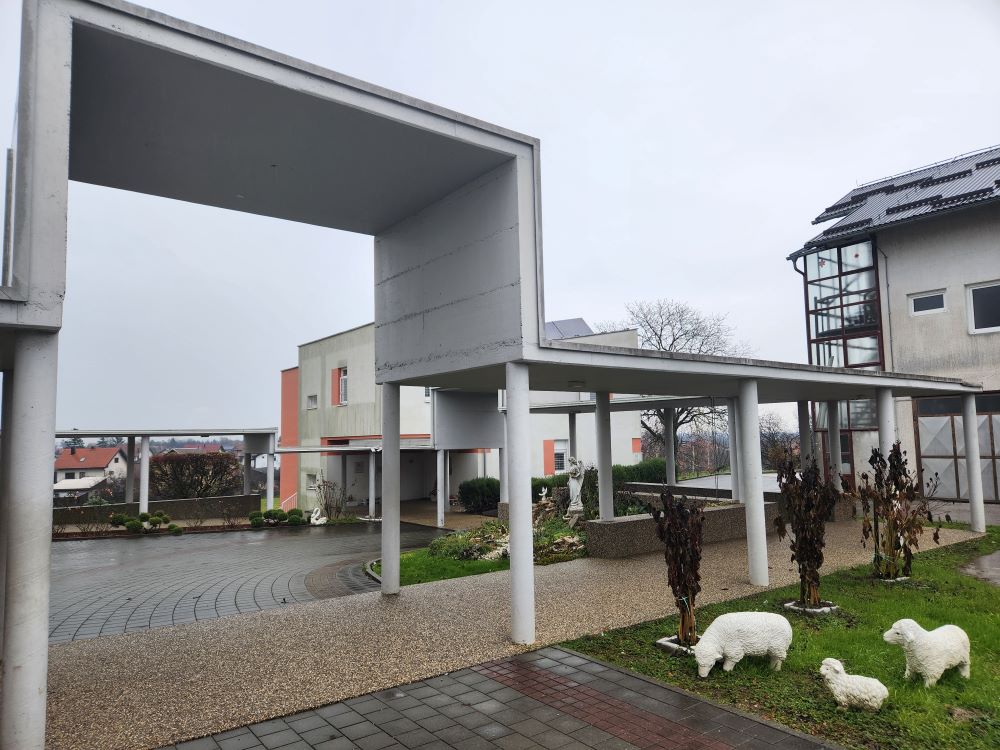
These buildings house children and young adults of St. Joseph's Home for Children, outside the Croatian capital of Zagreb. (GSR photo/Chris Herlinger)\
Other institutions do that — what makes what you do different?
The state has public homes. But as religious women, we don't just provide the material needs for children. The important thing is their souls — we want them to know God's love and accept Jesus for the rest of their lives.
As religious women, we try to be witnesses to the kingdom of God as we meet people on our journey — not just children, but teachers, benefactors. Without this charism, we'd just be social workers or teachers. This is an opportunity to witness and be a symbol of that kingdom. Sometimes people ask what we do and how we combine this work with religious life. We answer: Without prayer, without our relationship with God, it would be impossible to do what we do. With this deep connection to God, we can find meaning in this defined situation and offer to the Lord for the salvation of the world. That is why our community is both active and contemplative — we connect prayer and life in the presence of God with our ministry to children.
Is the education you offer formal catechism?
It's not formal religious education but informal meetings in the evenings, time for prayer, talk about faith, with attendance at Mass once a week and confession once a month. We also attend youth conferences with the children. We try to make it natural; they don't have to attend Mass or confession if they choose not to. They make those decisions themselves. It's important that faith becomes their personal decision and whether to become more engaged
Advertisement
What happens to those leaving the house?
We try to help with the transition beyond life here; most go on to work, a few go on to university. Young people can stay here for another year after finishing regular schooling. During this period, we jointly find accommodation (with a benefactor or independently) and a job. We always support a young person in order to navigate the new obligations and expectations placed before them, in order to master independent living. The average young person in Croatia has parental support as long as they need it, while the young people in our home are deprived of that support. In the process of independence for young people, the challenge is the financial settlement of monthly obligations, because young people who live in institutions have no contact with, for example, buying food and other necessities or paying utilities.
This is usually an unknown thing for them — some of them are also afraid. But we talk a lot about it and, if possible, hold workshops on this topic. After leaving home, it's a novelty that they have to learn to deal with all that immediately, so that they don't fall into debt and thereby make their already demanding life even more difficult.
What is the most fulfilling part of what you do?
Sometimes the fruit of our ministry we see immediately in the changes we see with the children. That's a strong motivation for continuing the work. Sometimes, of course, the fruits are not visible. But it's like we're planting the seeds in the soil and we hope and pray it will bear fruit someday. The most fulfilling thing is when the children accept faith and the Lord and become good people. That's especially fulfilling when the wounds they carry heal with time.


